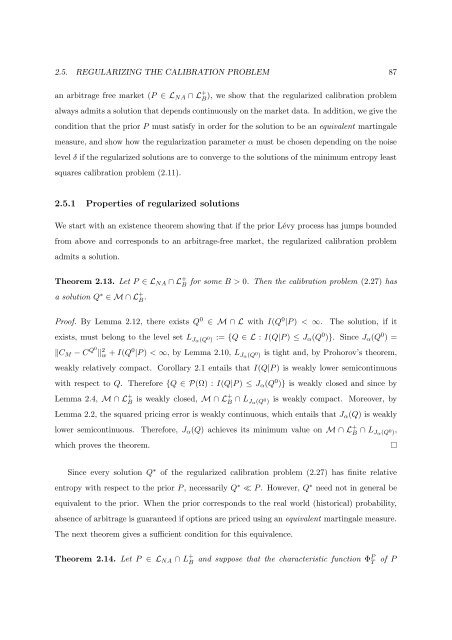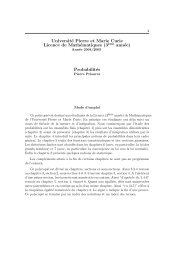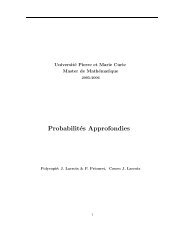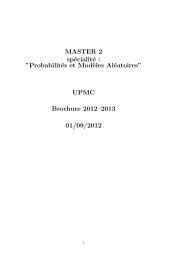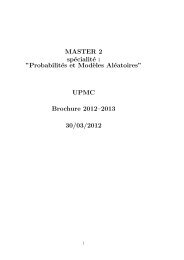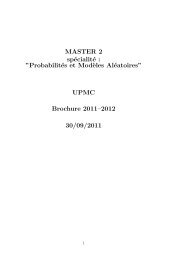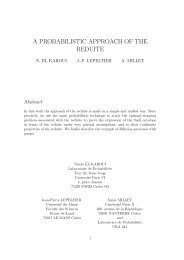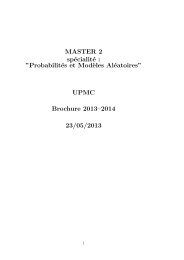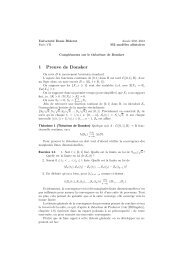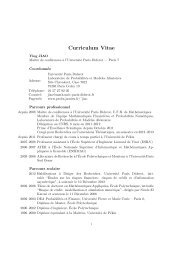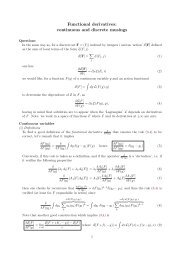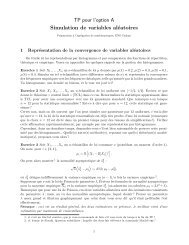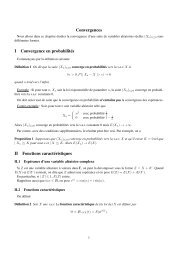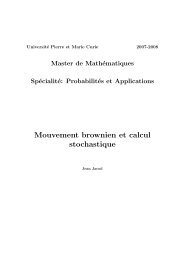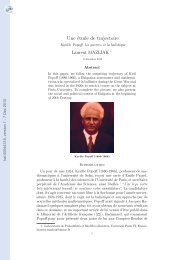Processus de Lévy en Finance - Laboratoire de Probabilités et ...
Processus de Lévy en Finance - Laboratoire de Probabilités et ...
Processus de Lévy en Finance - Laboratoire de Probabilités et ...
You also want an ePaper? Increase the reach of your titles
YUMPU automatically turns print PDFs into web optimized ePapers that Google loves.
2.5. REGULARIZING THE CALIBRATION PROBLEM 87<br />
an arbitrage free mark<strong>et</strong> (P ∈ L NA ∩ L + B<br />
), we show that the regularized calibration problem<br />
always admits a solution that <strong>de</strong>p<strong>en</strong>ds continuously on the mark<strong>et</strong> data. In addition, we give the<br />
condition that the prior P must satisfy in or<strong>de</strong>r for the solution to be an equival<strong>en</strong>t martingale<br />
measure, and show how the regularization param<strong>et</strong>er α must be chos<strong>en</strong> <strong>de</strong>p<strong>en</strong>ding on the noise<br />
level δ if the regularized solutions are to converge to the solutions of the minimum <strong>en</strong>tropy least<br />
squares calibration problem (2.11).<br />
2.5.1 Properties of regularized solutions<br />
We start with an exist<strong>en</strong>ce theorem showing that if the prior Lévy process has jumps boun<strong>de</strong>d<br />
from above and corresponds to an arbitrage-free mark<strong>et</strong>, the regularized calibration problem<br />
admits a solution.<br />
Theorem 2.13. L<strong>et</strong> P ∈ L NA ∩ L + B<br />
a solution Q ∗ ∈ M ∩ L + B .<br />
for some B > 0. Th<strong>en</strong> the calibration problem (2.27) has<br />
Proof. By Lemma 2.12, there exists Q 0 ∈ M ∩ L with I(Q 0 |P ) < ∞. The solution, if it<br />
exists, must belong to the level s<strong>et</strong> L Jα(Q 0 ) := {Q ∈ L : I(Q|P ) ≤ J α (Q 0 )}. Since J α (Q 0 ) =<br />
‖C M − C Q0 ‖ 2 w + I(Q 0 |P ) < ∞, by Lemma 2.10, L Jα(Q 0 ) is tight and, by Prohorov’s theorem,<br />
weakly relatively compact. Corollary 2.1 <strong>en</strong>tails that I(Q|P ) is weakly lower semicontinuous<br />
with respect to Q. Therefore {Q ∈ P(Ω) : I(Q|P ) ≤ J α (Q 0 )} is weakly closed and since by<br />
Lemma 2.4, M ∩ L + B is weakly closed, M ∩ L+ B ∩ L J α(Q 0 ) is weakly compact. Moreover, by<br />
Lemma 2.2, the squared pricing error is weakly continuous, which <strong>en</strong>tails that J α (Q) is weakly<br />
lower semicontinuous. Therefore, J α (Q) achieves its minimum value on M ∩ L + B ∩ L J α(Q 0 ),<br />
which proves the theorem.<br />
Since every solution Q ∗ of the regularized calibration problem (2.27) has finite relative<br />
<strong>en</strong>tropy with respect to the prior P , necessarily Q ∗ ≪ P . However, Q ∗ need not in g<strong>en</strong>eral be<br />
equival<strong>en</strong>t to the prior. Wh<strong>en</strong> the prior corresponds to the real world (historical) probability,<br />
abs<strong>en</strong>ce of arbitrage is guaranteed if options are priced using an equival<strong>en</strong>t martingale measure.<br />
The next theorem gives a suffici<strong>en</strong>t condition for this equival<strong>en</strong>ce.<br />
Theorem 2.14. L<strong>et</strong> P ∈ L NA ∩ L + B and suppose that the characteristic function ΦP T of P


